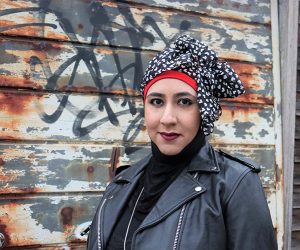2 Arts and Media
"Art is not what you see, but what you makes other to see." - Edgar Degas
Hanan Hazime
Hanan Hazime, widely recognized as The Mad Muslimah, is a Lebanese Canadian Muslim artist, writer, and arts educator who resides in Toronto 1. Born in London, Ontario to a family of Lebanese immigrants, she has become a significant figure in the world of art, particularly for her unwavering commitment to challenging stigmas surrounding mental health and advocating for marginalized communities 1,2

Hanan Hazime’s journey in the realm of art is nothing short of extraordinary. A multidisciplinary artist, creative writer, and community arts educator, Hanan has carved a niche for herself by pushing boundaries, questioning societal labels, and dispelling stereotypes. Her work is deeply intersectional and interdisciplinary, aiming to create safe and empowering spaces for marginalized communities, including Muslims, individuals with mental health challenges, people with disabilities, and BIPOC youth, to nurture their artistic talents 1,2
Hanan holds a Master of Arts degree in English Literature and Creative Writing from the University of Windsor, a testament to her academic prowess and commitment to her craft 1. Her academic background and lived experiences have uniquely equipped her to explore the complex relationship between identity, mental health, and societal perceptions.
One of her notable achievements is the conceptual art series “Labels,” a powerful exploration of how she is categorized by the world as a Lebanese Muslim, a woman, and an individual living with a mental illness. Displayed at the annual Workman Arts’ Rendezvous with Madness Festival, this series challenges preconceived notions and serves as a platform to engage in crucial dialogues on mental health and identity 2.
Hanan’s role as an arts educator has been equally impactful. She has shared her creative knowledge with patients at the Centre for Addiction and Mental Health in Toronto, facilitating workshops that use various art forms as a means of self-expression. Her dedication to amplifying the voices of marginalized individuals through art is evident in her extensive experience in teaching and organizing creative writing and multidisciplinary arts workshops 2.
As a visibly Muslim female artist living with a mental illness, Hanan has had to confront the dual challenges of Islamophobia and sanism (discrimination against people with mental illnesses). Her personal encounters with Islamophobia have had a profound impact on her mental health, exacerbating anxiety and feelings of insecurity in public spaces. Moreover, she has faced the disheartening tendency of some mental health professionals to dismiss the anxiety arising from such experiences as irrational fears. The intersectionality of her identities as a Muslim woman with a mental illness has also made it difficult for her to access employment, housing, and other essential resources, emphasizing the systemic discrimination faced by many individuals who share similar identities 2.
Hanan’s commitment to challenging stigmas extends beyond her personal experiences. She strives to dispel stereotypes, empower those facing mental health challenges, and question binary classifications, all through her art. Her work calls for a broader conversation on mental health, aiming to show that individuals living with mental illness are complex and multifaceted, with dreams, goals, and passions that are not defined by their mental health 2.
Key Takeaways
Find out more:
1. Hanan Hazime | artist • writer • educator
Timaj Garad
Based in Toronto, Timaj Garad is a well-known multidisciplinary storyteller, arts educator, and creative consultant of Ethiopian and Canadian descent. She currently lives in Toronto. She uses spoken word poetry, music, and theater as a means of expressing her autobiographical experiences through her artistic expression.

Black Muslim woman Timaj uses her art to confront injustice, reveal the truth, and encourage healing. She is a poet and artist who has won awards. She has led many of her own creative workshops and appeared at over 300 events across the country. Apart from her artistic endeavors, Timaj is acknowledged for her work as a community organizer, making contributions to the nexus of social justice, culture, and identity. 1,2
She co-founded the Kitchener-Waterloo Poetry Slam in 2010. Timaj, who received the 2012 City of Waterloo’s Top 40 Under 40 award, has performed on stages alongside well-known poets such as Sonia Sanchez and Warsan Shire. She currently is committed to community involvement and art education. Timaj is well known for her community arts initiatives, such as Project Heartwork, LUMINOUS Fest, Canada’s first Black Muslim Arts Festival, and Stellar (R)evolution. She was named one of eight Muslim Youth Making an Impact by CBC in the same year that her influential work made her a finalist for Artist of the Year at the Muslim Awards for Excellence in 2018. 1,2
Timaj is dedicated to removing obstacles brought about by anti-Black prejudice in the arts as a Black artist who is closely associated with and influenced by the Black arts community. She underlines how important it is for Black artists to have greater access to and opportunities to succeed. Her objective is to establish a community-based program that recognizes and addresses different intersections while meeting the varied needs of the Black community. In line with Timaj’s vision, systemic anti-Black racism will be challenged, and artists from TAC’s equity-priority groups will be supported by grants and strategic initiatives.3
The Toronto Arts Council’s Outreach & Access Program Manager, Timaj Garad, first worked with TAC in 2018 when she received an Animating Toronto Parks grant for LUMINOUS Fest, Canada’s first Black Muslim Arts Festival. Timaj has been involved in community-based art events and workshops for over 15 years, during which she has written songs, performed, and participated in spoken word. In her current role, she hopes to address issues facing the community, elevate voices, and advance community development via the arts. Her new single and music video, “Black Gold,” was released recently.2, 3
She sees the stage as the starting point of her artistic journey, where stories create positive change and vulnerability becomes a strength. Timaj hopes to uplift, comfort, provoke thought, encourage healing, and unite people via spoken word and music. Her performances are a source of love and light, allowing people to compassionately move toward their purpose.1
Key Takeaways
Find out more:
How to find them:

